Marc Lesser's Blog, page 6
July 11, 2024
Poetry and Pragmatism
· Insights Into Practices
· Zen Puzzler: Whatever you meet is the path
· What I’m Reading: Two children’s books
· Half-day Retreat: In Mill Valley
· Weekend Retreat: Green Gulch Farm
Insights Into Practices
I’m often drawn to these few lines of “poetry and pragmatism” from a poem by Tony Hoagland:
“Do you remember?
that time and light are kinds
of love, and love
is no less practical
than a coffee grinder
or a safe spare tire?”
The worlds of work, business, and leadership generally emphasize being pragmatic — filled with coffee grinders and spare tires. The word pragmatic comes from the Greek word pragmatikos, which means skilled in business. Much of our days, our work, and attention tend to be focused on what is practical. It’s easy to lose sight of the poetry of our time, transitions, humanity, birth, death, and love — and how these are all woven into the many pragmatic aspects of work, business, leadership, and life, when we pay attention, when we find time to listen more deeply.
We are all weavers, weaving together the practical and the poetic. A few minutes of remembering, or listening, or poetry every day can go a long way, to support this weaving.
Washing the dishes, business planning, or leading meetings can be a chore or they can be acts of love. You get to choose. Our days can be rooted in the practical as well as rooted in the aspirational, loving, and poetic.
Here is the full poem. It emphasizes not only the poetic but also the importance of pleasure and a reminder that “the kingdom still exists” for anyone willing to “find the time, to sit out in the sun to listen.”
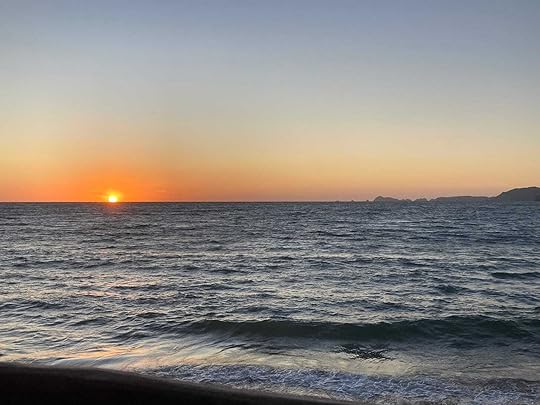
The Word
Down near the bottom
of the crossed-out list
of things you have to do today,
between “green thread”
and “broccoli” you find
that you have penciled “sunlight.”
Resting on the page, the word
is as beautiful, it touches you
as if you had a friend
and sunlight were a present
he had sent you from some place distant
as this morning — to cheer you up,
and to remind you that,
among your duties, pleasure
is a thing,
that also needs accomplishing
Do you remember?
that time and light are kinds
of love, and love
is no less practical
than a coffee grinder
or a safe spare tire?
Tomorrow you may be utterly
without a clue
but today you get a telegram,
from the heart in exile
proclaiming that the kingdom
still exists,
the king and queen alive,
still speaking to their children,
–to any one among them
who can find the time,
to sit out in the sun and listen.
~ Tony Hoagland, from Sweet Ruin (1992)
Zen Puzzler: Whatever you meet is the path.
Zen koans or what I sometimes call puzzlers are stories or phrases intended to free our minds from greed, hatred, and confusion. There are hundreds of traditional Zen koans that have been handed down from Chinese Zen teachers from 1,500 years ago. I love studying these, and I also am drawn to selecting and creating more modern and accessible stories and phrases. For me, these are tools and practices for deepening and integrating a pragmatic and poetic life.
Today’s Zen puzzler comes from a Tibetan Buddhist tradition called lojong teachings. These are teachings that use various slogans as a way of supporting us to become more aware and more clear about our motivations. These are practices for shifting from being a victim to having greater agency, and greater freedom.
The slogan for today is, “Whatever you meet is the path.” Imagine anytime you are feeling tired, frustrated, or grumpy you come back to this expression, “Whatever you meet is the path.” Our challenges are the path. Our grumpiness is the path. Our love, our passions, our desires, things that push us away, whatever it is we’re feeling, are all the path.
One very practical way to work with this koan is to do some journal writing about it. What does this mean, Whatever you meet is the path? Or write it down on a card and keep it somewhere on your desk or maybe on the dashboard of your car. Driving can be inspirational: imagine seeing driving, whether you’re in traffic or being cut off by another driver, though the lens “Whatever you meet is the path.”
What I’m Reading
Meteor! by Patricia Polacca. This is a children’s book that works well for adults. It’s about how we can empower small and large events through our belief system.
Everyone Knows What A Dragon Looks Like, by Jay Williams and Mercer Mayer. This is one of my favorite children’s books. Beautifully illustrated and a great story.
Half Day Sitting, In-Person and Online – Sunday October 13th
9:00 a.m. – 12:30 p.m. in Mill Valley.
I really like half day retreats, where there is time for some extended meditation periods, some walking, and time to process with a small community. Then, time to enjoy a Sunday afternoon.
Weekend Retreat In-person, Green Gulch Farm
November 1 – 3
Come spend the weekend at Green Gulch Farm, located on the coast, just north of San Francisco. Wake up hearing the sound of the ocean, enjoy the simple but amazing vegetarian food, and explore the garden, farm, and coastal trails.
In our world of busyness, of more, faster, better, this retreat offers time to stop, reflect, and renew – a time to step fully into the richness of your life. Together we’ll follow a gentle schedule of sitting and walking meditation, interspersed with talks and discussions from the wisdom of Zen teaching as we explore how these stories and dialogues may be utilized in our relationships, our work, and our lives
This retreat is open to all people interested in stopping, exploring, and bringing more awareness and mindfulness to daily life
The post Poetry and Pragmatism appeared first on Marc Lesser.
July 5, 2024
For Wellbeing, Return To The Well
Insights Into Practices
I once led a day-long meditation retreat for a group of twelve Google engineers. We did several 30-minute periods of meditation in the morning and afternoon, interspersed with indoor and outdoor walking meditation. At the end of the day they each expressed great surprise and appreciation of the experience. They felt the depth of rest, quiet, and insight as significantly different than what they had experienced from meditating each morning for twenty or thirty minutes. Several participants asked, “Do we need to go to a monastery in order to have this depth of practice?”
I responded that monastic practice is great, but probably not practical for most of them. Instead, I suggested they explore making a corner of their homes into a monastery. That is, have a place where you can have a regular meditation practice, a place where you can step out of the river of daily activity, of cell phones and screens, and just sit, study, or write in your journal. For real wellbeing, find a regular time and place to return to the well.
I recently returned from spending six days at Tassajara Zen Mountain Center, for a work-study retreat with the Mill Valley Zen community. We followed the early morning meditation schedule, worked in the mornings, and spent time studying together each afternoon. One morning was a half-day of quietly sitting and walking. I got to bake bread several times. (I made about 30 loaves of cornmeal millet bread and 15 loaves of onion dill.) For me, being at Tassajara, sitting, working, and baking are forms of returning to the well of practice.
Wellbeing can mean many things. Classically, it is defined as a combination of spiritual, physical, psychological, social, economic, and environmental health:
Spiritual Health – Life satisfaction and appreciation; a sense of meaning and purpose
Physical Health – Diet, exercise, and sleep; a healthy body and mind
Psychological Health – Safety, security, a healthy attitude and practices for navigating stress and anxiety
Social Health – Good friends, established networks,
and strong sense of belonging
Economic Health – Financial stability
Environmental Health – Clean air and water, access to nature
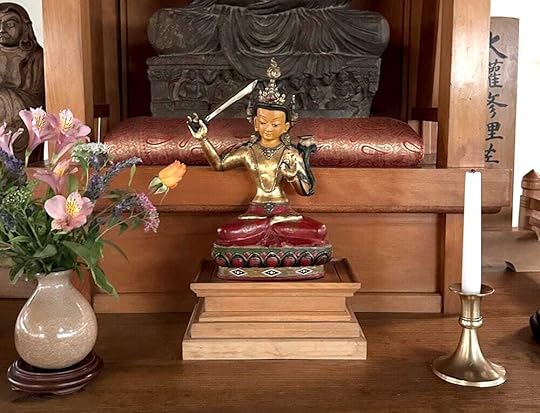
Wellbeing Practices
Assess: Which of these wellbeing practices are in good shape, and which could use more attention?
Deepen, Sustain, and Integrate
Deepen: Look for ways to deepen your practice through extended retreats or ways of stepping away from screens and the daily demands.
Sustain: Find ways to sustain practice with a daily meditation or journaling practice.
Integrate: Bring your aspiration to be more aware and help others into your work, relationships, and all parts of daily life.
Find regular ways to return to the well, in whatever ways that means to you. Create a “sacred space” in your home for meditation and journal writing. Participate in extended meditation retreats. Exploring making reading, work, and all activities a form of returning to the well.
What I’m Reading
Mind Magic, The Neuroscience of Manifestation and How It Changes Everything, by James Doty – Part autobiography, part inspiration, and part program for aligning your state of mind with your deepest aspirations.
My Favorite Quote This Week
Right now my life is one learning
experience after another, by the
end of the week
I should be a genius.
Weekend Retreat at Green Gulch Farm
November 1 – 3
Come spend the weekend at Green Gulch Farm, located on the coast, just north of San Francisco. Wake up hearing the sound of the ocean, enjoy the simple but amazing vegetarian food, and explore the garden, farm, and coastal trails.
In our world of busyness, of more, faster, better, this retreat offers time to stop, reflect, and renew – a time to step fully into the richness of your life. Together we’ll follow a gentle schedule of sitting and walking meditation, interspersed with talks and discussions from the wisdom of Zen teaching as we explore how these stories and dialogues may be utilized in our relationships, our work, and our lives.
This retreat is open to all people interested in stopping, exploring, and bringing more awareness and mindfulness to daily life.
The post For Wellbeing, Return To The Well appeared first on Marc Lesser.
June 27, 2024
You Go First: In Leadership and Life
· Insights Into Practices
· A Poem: I’m Nobody, by Emily Dickinson
· What I’m Reading
· Weekend Retreat
Insights Into Practices
Have you noticed that it can be challenging to have healthy, trusting, supportive, sustainable relationships at work and outside of work?
As to why, I think of the opening of the book The Politics of Experience by psychiatrist R.D. Laing:
“I cannot experience your experience.
You cannot experience my experience.
Therefore we are invisible to each other.”
I’m not quite as pessimistic as R.D. Laing, but the message is important: We can’t know another person’s experience. It’s easy to think or believe we know other’s feelings and intentions. This can lead to assumptions, misunderstandings, lack of alignment, and a lack of trust. I see this regularly in my work with leaders and organizations.
One practice that I’ve found as simple and effective (and that I aspire to do more often) is: “You Go First.” That is, whatever you are wanting or needing from someone — more attention, kindness, friendliness, or compassion – instead of waiting or withdrawing or creating a narrative as to what this person’s experience or intention is – You Go First. Whatever quality you want from someone else, don’t wait. Explore being more attentive, friendly, or curious.
This approach means letting go of “being right” or another person “being wrong” or staying safe with whatever your story or narrative might be. Instead, it is a way of taking small risks, building bridges, with the aspiration of creating healthier relationships.
Practice:
You would like to be more appreciated. You Go First, by appreciating others more.
You want more respect or more attention. You Go First, by respecting and giving more of your attention.
You want more curiosity and connection. You Go First, by being more curious and connected.
Whatever you feel is missing, You Go First.
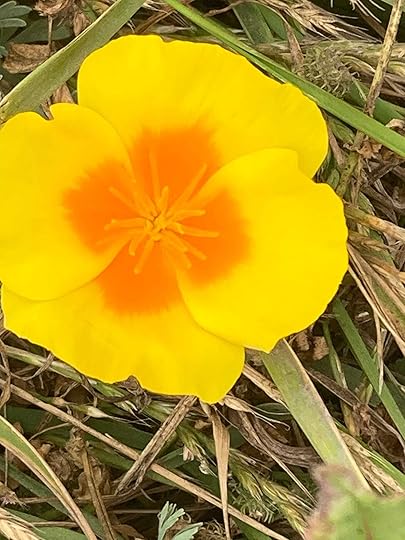
A Poem
I’m nobody! Who are you?
Are you nobody, too?
Then there’s a pair of us — don’t tell!
They’d banish us, you know.
How dreary to be somebody!
How public, like a frog
To tell your name the livelong day
To an admiring bog!
A beautiful Zen poem! The practice of shifting from self to selflessness.
What I’m Reading
The Righteous Mind, Why Good People Are Divided By Politics and Religion, Jonathan Haidt – Compelling questions and ideas regarding the divides and polarization, that seem to be everywhere we look.
Ask Me. 100 Essential Poems, William Stafford. I keep returning to this wonderful book of poetry.
Weekend Retreat at Green Gulch Farm : Step Into Your Life
November 1st – 3rd
Come spend the weekend at Green Gulch Farm, located on the coast, just north of San Francisco. Wake up hearing the sound of the ocean, enjoy the simple but amazing vegetarian food, and explore the garden, farm, and coastal trails.
In our world of busyness, of more, faster, better, this retreat offers time to stop, reflect, and renew – a time to step fully into the richness of your life. Together we’ll follow a gentle schedule of sitting and walking meditation, interspersed with talks and discussions from the wisdom of Zen teaching as we explore how these stories and dialogues may be utilized in our relationships, our work, and our lives.
This retreat is open to all people interested in stopping, exploring, and bringing more awareness and mindfulness to daily life.
The post You Go First: In Leadership and Life appeared first on Marc Lesser.
June 13, 2024
Meditation Is Like Going To the Gym. Meditation is Nothing Like Going To the Gym
Insights Into Practices
· A Guided Meditation
· What I’m Reading
· Weekend Retreat
1×0:00-4:52(Recording of this Newsletter, under 5 minutes)
Several years ago I co-led a mindful leadership program for Google’s doctors and health care providers. My co-teacher was a Google employee who was a doctor and a neuroscientist. After introducing the topics of mindfulness and emotional intelligence, my co-teacher described meditation as “much like going to the gym.” Each time you bring your attention back to your breath, you are improving your ability to focus, like strengthening a muscle as you repeat this process again and again.
I thanked my co-teacher and said that while I somewhat agreed with this metaphor, it is also true that “meditation is nothing like going to the gym.”
My co-teacher was a bit surprised. He smiled, looked at me, and said enthusiastically to the participants, “Well, that’s why we have two teachers!”
Fortunately, we had a really good, trusting relationship. We had been working together for the previous year and he (mostly) appreciated my contradiction.
I clarified that going to the gym implies that you are meditating to get a result and that you expect a step-by-step improvement.
Having a reason or a goal can be useful, and encouraging, when it comes to having the motivation to meditate. And, more stability and being less tossed around by thoughts may be one of the benefits of a regular meditation practice.
But, this “going to the gym” metaphor can be a hindrance or limit to the real power and benefits of meditation practice — the practice of knowing yourself and going beyond yourself, shifting your relationship with fears, stress, and anxiety, and living and working with more appreciation, richness, and depth.
Another approach to meditation is to completely let go of any ideas or hopes of improving or getting anything. Instead, as you meditate, see what it is like to just be quiet, still, breathing, and alive. Explore appreciating your experience, seeing yourself and accepting yourself as you are, without any idea of improvement, expectations, or gain. Boredom, grieving, regrets, joys, possibilities: All interesting and informative.

This practice, of letting go of improvement and expectations can be strangely empowering and effective in opening our ability to listen, understand, and shift our relationship with the narratives and problems that we engage with daily.
Here is what Shunryu Suzuki says about meditation practice:
“When we become truly ourselves, we are purely independent of, and at the same time, dependent upon everything.
Each one of us is in the midst of myriads of worlds.
We are in the center of the world always, moment after moment. If you have this kind of experience, you will not be bothered by anything.
This kind of activity is the fundamental activity.”
Practice: Try a daily meditation practice. If you only have 3 minutes try that. 20 – 30 minutes, great. I generally prefer sitting quietly. Some people find guided meditation useful. Find a quiet place to sit. Notice your breath, body, feelings, and thoughts. Explore what it feels like to not need anything, to not expect anything. Let go of ideas of doing it right. Bring curiosity to accepting yourself. Explore loving yourself.
Here is a 5-minute guided meditation.
1×0:00-5:32
What I’m Reading
Heroic Leadership, by Chris Lowney – Leadership principles and practices from the Jesuits, who have been cultivating these skills for the last 450 years.
The Black Swan, by Nassim Nicholas Taleb – These days so much seems highly improbable, from Obama to Trump, Artificial Intelligence, The Pandemic, etc., etc. This is an interesting, and not always easy read about how to think about these improbable events.
Weekend Retreat at Green Gulch Farm
November 1 – 3
Come spend the weekend at Green Gulch Farm, located on the coast, just north of San Francisco. Wake up hearing the sound of the ocean, enjoy the simple but amazing vegetarian food, and explore the garden, farm, and coastal trails.
In our world of busyness, of more, faster, better, this retreat offers time to stop, reflect, and renew – a time to step fully into the richness of your life. Together we’ll follow a gentle schedule of sitting and walking meditation, interspersed with talks and discussions from the wisdom of Zen teaching as we explore how these stories and dialogues may be utilized in our relationships, our work, and our lives.
This retreat is open to all people interested in stopping, exploring, and bringing more awareness and mindfulness to daily life.
The post Meditation Is Like Going To the Gym. Meditation is Nothing Like Going To the Gym appeared first on Marc Lesser.
June 12, 2024
Listen. Listen. My Enthusiasm For Commencement Speeches
Audio playback is not supported on your browser. Please upgrade.
(Recording of this Newsletter)
The word enthusiasm come from the Greek word entheos which means “the God within.”
I appreciated film-maker Ken Burns recent commencement speech at Brandeis University. Speaking to a group of new graduates, he sometimes paused and implored, “Listen. Listen.” It felt like something deep within him wants to truly impart his experience to young people, starting out in a new chapter of life.
I think that part of my enthusiasm for these commencement speeches is the feeling that we are always starting a new chapter of our lives. Listening to these talks is a chance to stop, pause, and reset. In Ken Burns speech he unpacks the word enthusiasm as originating with the Greek word entheos, which means the God within. When we let go of our old ideas, our old sense of self and step or “commence” toward what is next, it is a way of accessing something deep within us.
Here are a few pieces from his speech, as well as a few short parts of Anna Quindlen’s commencement speech from 2020, and Steve Job’s speech from 2006. And a few words from Shunryu Suzuki.
May 2024, Ken Burn, Brandeis University
“A very wise person I know with years of experience with the Middle East recently challenged me, “Could you hold the idea that there could be two wrongs and two rights?”
Listen, listen. In a filmed interview I conducted with the writer James Baldwin, more than 40 years ago, he said, “No one was ever born who agreed to be a slave, who accepted it. That is, slavery is a condition imposed from without. Of course, the moment I say that,” Baldwin continued, “I realize that multitudes and multitudes of people for various reasons of their own enslave themselves every hour of every day to this or that doctrine, this or that delusion of safety, this or that lie. Anti-Semites, for example,” he went on, “are slaves to a delusion. People who hate Negroes are slaves. People who love money are slaves. We are living in a universe really of willing slaves, which makes the concept of liberty and the concept of freedom so dangerous,” he finished. Baldwin is making a profoundly psychological and even spiritual statement, not just a political or racial or social one. He knew, just as Lincoln knew, that the enemy is often us. We continue to shackle ourselves with chains we mistakenly think is freedom.”
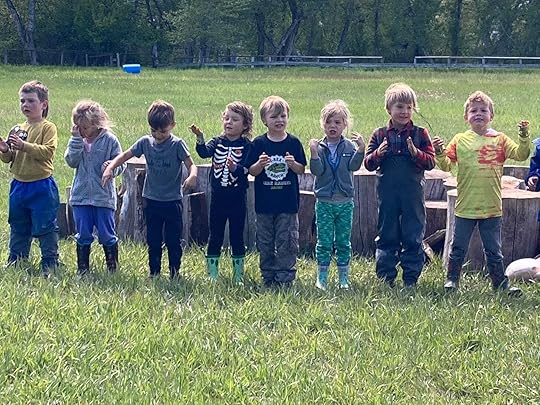
(My grandson’s pre-school graduation ceremony. No commencement speech.)
From Anna Quindlen’s Commencement address at Villanova, June 2000:
“Get a life. A real life, not a manic pursuit of the next promotion, the bigger paycheck, the larger house. Do you think you’d care so very much about those things if you blew an aneurysm one afternoon, or found a lump in your breast? Get a life in which you notice the smell of salt water pushing itself on a breeze over Seaside Heights, a life in which you stop and watch how a red-tailed hawk circles over the water gap or the way a baby scowls with concentration when she tries to pick up a cheerio with her thumb and first finger.
Get a life in which you are not alone. Find people you love, and who love you. And remember that love is not leisure, it is work. Each time you look at your diploma, remember that you are still a student, still learning how to best treasure your connection to others. Pick up the phone. Send an e-mail. Write a letter. Kiss your Mom. Hug your Dad. Get a life in which you are generous.
Look around at the azaleas in the suburban neighborhood where you grew up; look at a full moon hanging silver in a black, black sky on a cold night.
And realize that life is the best thing ever, and that you have no business taking it for granted. Care so deeply about its goodness that you want to spread it around. Once in a while take money you would have spent on beers and give it to charity. Work in a soup kitchen. Be a big brother or sister.
…Consider the lilies of the field. Look at the fuzz on a baby’s ear. Read in the backyard with the sun on your face. Learn to be happy. And think of life as a terminal illness because if you do you will live it with joy and passion, as it ought to be lived.”
A few lines from Steve Jobs 2005 Commencement speech at Stanford :
“Remembering that I’ll be dead soon is the most important tool I’ve ever encountered to help me make the big choices in life. Because almost everything — all external expectations, all pride, all fear of embarrassment or failure — these things just fall away in the face of death, leaving only what is truly important. Remembering that you are going to die is the best way I know to avoid the trap of thinking you have something to lose. You are already naked. There is no reason not to follow your heart.
Your time is limited, so don’t waste it living someone else’s life. Don’t be trapped by dogma — which is living with the results of other people’s thinking. Don’t let the noise of others’ opinions drown out your own inner voice. And most important, have the courage to follow your heart and intuition. They somehow already know what you truly want to become. Everything else is secondary.”
And a few words from Zen teacher Shunryu Suzuki, (not a commencement speech)
The most important thing is to be able to enjoy your life without being fooled by things.
“That things change is the reason why you suffer in this world and become discouraged. When you change your understanding and your way of living, then you can completely enjoy your new life in each moment. The evanescence of things is the reason why you enjoy your life…your life becomes stable and meaningful.”
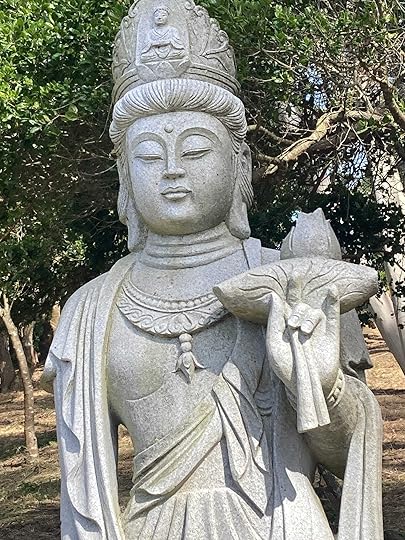
(This 8-foot tall concrete Buddha is at the top of Fernwood Cemetery, in Mill Valley, CA.)
A Poem
The Secret, by Denis Levertov
Two girls discover
the secret of life
in a sudden line of
poetry.
I who don’t know the
secret wrote
the line. They
told me
(through a third person)
they had found it
but not what it was
not even
what line it was. No doubt
by now, more than a week
later, they have forgotten
the secret,
the line, the name of
the poem. I love them
for finding what
I can’t find,
and for loving me
for the line I wrote,
and for forgetting it
so that
a thousand times, till death
finds them, they may
discover it again, in other
lines
in other
happenings. And for
wanting to know it,
for
assuming there is
such a secret, yes,
for that
most of all.
What I’m Watching
Jon Stewart – Brilliantly and humorously addressing our political scene. Every Monday evening on Comedy central and available on Youtube.
Weekend Retreat at Green Gulch Farm
November 1 – 3
Come spend the weekend at Green Gulch Farm, located on the coast, just north of San Francisco. Wake up hearing the sound of the ocean, enjoy the simple but amazing vegetarian food, and explore the garden, farm, and coastal trails.
In our world of busyness, of more, faster, better, this retreat offers time to stop, reflect, and renew – a time to step fully into the richness of your life. Together we’ll follow a gentle schedule of sitting and walking meditation, interspersed with talks and discussions from the wisdom of Zen teaching as we explore how these stories and dialogues may be utilized in our relationships, our work, and our lives.
This retreat is open to all people interested in stopping, exploring, and bringing more awareness and mindfulness to daily life.
Zen Bones is a reader-supported publication. To receive new posts and support my work, consider becoming a free or paid subscriber.
The post Listen. Listen. My Enthusiasm For Commencement Speeches appeared first on Marc Lesser.
May 24, 2024
How Do You Step From The Top Of A 100-Foot Pole?
There is a classic Zen “koan” a teaching story. It goes like this:
You who sit on the top of a hundred foot pole,
Although you have entered the Way, it is not genuine.
Take a step from the top of the pole
And the entire universe is in your eye
Do you ever feel like your life is like being perched on top of a hundred foot pole? I do, especially when I think about our upcoming election, our divisive politics, and our sometimes frightening and unpredictable world events. And, closer to home, how about in the issues, problems, and decisions we make about our families, our work, relationships…life? There is no shortage of uncertainty, when we pay attention; no shortage of feeling perched between knowing and not knowing, or confidence and humility.
· The point of this Zen teaching story is to transform fear to fearlessness and to help us wake up to the reality of our lives.
· It aims toward revealing real freedom and a more genuine way of living, knowing that everything is uncertain and precarious.
· And these words suggest letting go of old mental models and seeing yourself and the world through fresh eyes.
In what way does your life feel uncertain and precarious? How can you transform fear into freedom and possibility?
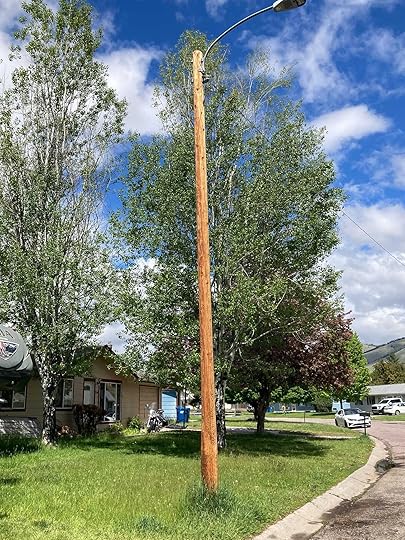
In a talk by Zen teacher Shunryu Suzuki, he addresses this teaching story and these questions by saying:
“The secret is just to say “Yes “and jump off from here. There is no problem. It means to be yourself in the present moment, always yourself, without sticking to an old self. You forget all about yourself and are refreshed….
Continue to have generous mind, big mind and soft mind — to be flexible, not sticking to anything….When we are not afraid of anything, we are imperturbable. To be completely concentrated on what you do, that is simplicity. And the beauty of practice is that it can be extended endlessly.”
Practices
Say yes, to yourself – Instead of doubting or undervaluing ourselves, this is the practice of a full-bodied “yes” to our own wellbeing, health, needs, and aspirations.Be yourself without sticking to your old self – This is a shift in our patterns, habits, and mental models; letting go of the inner critic, the “shoulds” and opening our hearts and mindsFace and transform fear – Easier said than done, but an important practice and aspiration, by not sticking to your old self.Practice with a more generous, big and soft mind – Generosity is a core mindfulness practice; being generous with ourselves, our time, and our attention.Concentrate on what you do – Less over-thinking, and more warmhearted curiosity.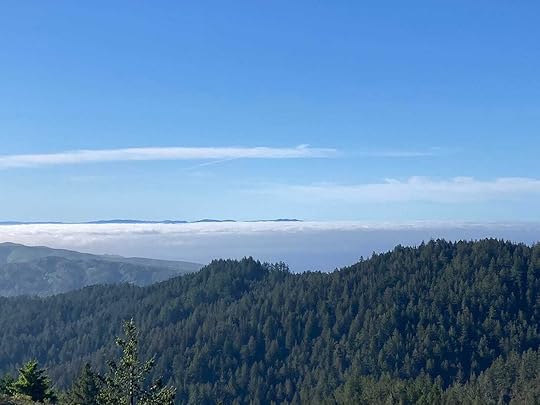
A Favorite Quote This Week
“I keep thinking that what we need is a new language…a language of the heart….a new kind of poetry that tells us where the honey is…. And I think that in order to create that language you’re going to have to learn out how to go through a looking glass into another kind of perception where you have that sense of being united to all things…. And suddenly you understand everything.”
– My Dinner With Andre
A Poem, by Rainer Maria Rilke
I am too alone in the world, and not alone enough, to make every minute holy.
I want to unfold
I don’t want to stay folded anywhere,
Because where I am folded, there I am a lie.
And I want my grasp of things to be true.
I want to describe myself like a painting that I looked at closely for a long time,
Like a saying that I finally understood, like the pitcher I use every day,
Like the face of my mother, like a ship that took me to safety
Through the wildest storm of all.
Half Day Sitting, In-Person and Online – This Sunday Morning
Sunday, May 26th, 9:00 a.m. – 12:30 p.m. in Mill Valley.
I really like half day retreats, where there is time for some extended meditation periods, some walking, and time to process with a small community. Then, time to enjoy a Sunday afternoon.
With warm regards,
Marc
The post How Do You Step From The Top Of A 100-Foot Pole? appeared first on Marc Lesser.
May 16, 2024
Stop Giving Away Your Power
· Insights Into Practices
· A Poem, by William Stafford
· A favorite quote this week
· What I’m reading
· Half Day Retreat
· Weekend Retreat
Power, and the right use of power is a favorite topic of mine; both from my past experience as well as the work I do now with leaders and organizations.
When I was a young Zen student, living at the San Francisco Zen Center’s Green Gulch Farm, my good friend and mentor Yvonne said to me “Marc, you have a way of pissing away your power.”
Due to my expensive Zen training, I realized this was not a compliment. At the same time it was a great gift. It led me to delve into the question of power. And it made me wonder – 1) what power did Yvonne see in me that I didn’t see in myself?; 2) how did I give power away?; and 3) what does the right use of power look like?
Power and the wise use of power may be one of the most important topics for individuals, for our organizations, and for our planet today. I’m not talking about that kind of power – the misuse and abuses of power over others, or the power that comes from a need to prove self-worth. Power, in its widest, most positive, truest sense, is the power to be present, to act with clarity, to influence, to connect, and to be an agent of positive change.
How do you give away your power? I’ve asked this question in workshops, trainings and executive coaching meetings and here are some of the most common responses:
· I say “yes” when I mean “no.”
· I avoid conflicts and difficult situations
· I rush from one thing to another, totally caught up in “busyness.”
· I overthink decisions, then overthink my overthinking.
· I underestimate my abilities.
· I don’t make clear requests or ask for help, even though I know others want to support me.
These are just the most popular or common ways people give away power. Others are procrastinating or not making the space for regular wellbeing practices.
Power is like electricity running through wires – completely invisible and completely essential for how we feel, relate, act, and live. When we use our power for good, we support our personal well-being, mitigate fear and self-doubt, foster compassion and understanding, and encourage critical thinking and an open mindset.
Here are some core practices for the right use of power.
· Don’t avoid conflict. Be willing to say no. Be willing to have difficult conversations.
· Be real. Be vulnerable. Be courageous. Be willing to take a stance, especially when it feels difficult.
· Be more realistic about your competence. Turn doubts into possibilities. Be curious. Depend more on others. Try making clear requests.
· Be aware of busyness as a way of avoiding stress and anxiety. Make more space to do less. Try deciding more easily and see what happens.
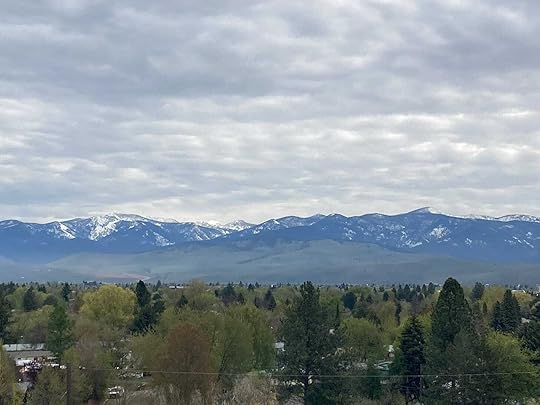
(Springtime in Missoula, Montana)
A Poem
First Grade, by William Stafford,
In the play Amy didn’t want to be
anybody; so she managed the curtain.
Sharon wanted to be Amy. But Sam
wouldn’t let anybody be anybody else
he said it was wrong. “All right,” Steve said,
“I’ll be me but I don’t like it.”
So Amy was Amy, and we didn’t have the play.
And Sharon cried.
My commentary: Yes, this reminds me of how my mind works at times; my small mind or comparing mind.
And it reminds me of the way people in organizations often communicate with each other.
Shunryu Suzuki says that laughing at ourselves is a form a awakening…
A Favorite Quote
The course of history is unpredictable, as irregular as the weather, as errant as affection, nations rising and falling by whim and change, battered by violence, corrupted by greed, seized by tyrants, raided by rogues, and addled by demagogues.
– This is the first sentence from These Truths, by Jill Lepore
What I’m reading
These Truths, A History of the United States – I’m now reading this book for the third time. It begins with Columbus and ends with Trump. I love better understanding the dark sides and the inspired sides of our history.
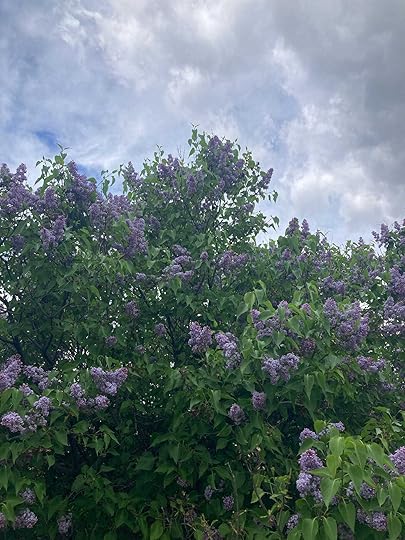
Half Day Sitting, In-Person and Online
Sunday, May 26th, 9:00 a.m. – 12:30 p.m. in Mill Valley.
I really like half day retreats, where there is time for some extended meditation periods, some walking, and time to process with a small community. Then, time to enjoy a Sunday afternoon.
Weekend Retreat at Green Gulch Farm
November 1 – 3
Come spend the weekend at Green Gulch Farm, located on the coast, just north of San Francisco. Wake up hearing the sound of the ocean, enjoy the simple but amazing vegetarian food, and explore the garden, farm, and coastal trails.
In our world of busyness, of more, faster, better, this retreat offers time to stop, reflect, and renew – a time to step fully into the richness of your life. Together we’ll follow a gentle schedule of sitting and walking meditation, interspersed with talks and discussions from the wisdom of Zen teaching as we explore how these stories and dialogues may be utilized in our relationships, our work, and our lives.
This retreat is open to all people interested in stopping, exploring, and bringing more awareness and mindfulness to daily life.
The post Stop Giving Away Your Power appeared first on Marc Lesser.
Do Not See With Ordinary Eyes. Do Not Think With Ordinary Mind
· Insights Into Practices
· My Favorite Quote this week, by Rachel Naomi Remen
· What I’m watching
· Half Day Retreat
· Weekend Retreat
This phrase, “Do not see with ordinary eyes and do not think with ordinary mind” comes from a 13th century essay called Instructions To The Head Cook, by Zen teacher Dogen. We often think that “mindful leadership” is a 21st century idea, when actually it was beautifully articulated 800 years ago. This essay is detailed instructions for moving beyond self-centered, small-minded leadership to more selfless, caring, big-minded leadership.
Dogen’s teaching is aimed at what I would call our “structure of interpretation.” There are events and there is how we interpret these events. Someone asking me “How is your book coming along? could be seen as a criticism, support, or neutral, depending on my relationship with this person, but most of all my state of mind and my interpretation of the question.
Though the world may be experienced as ordinary, Dogen highlights several limiting, narrow ways of seeing and thinking when we experience the world as only ordinary:
– taking things for granted, being dismissive, and not appreciating everything
– being critical and judgmental while undervaluing your influence and power
– avoiding what is difficult and painful, and not valuing the joys and celebrations of this human life
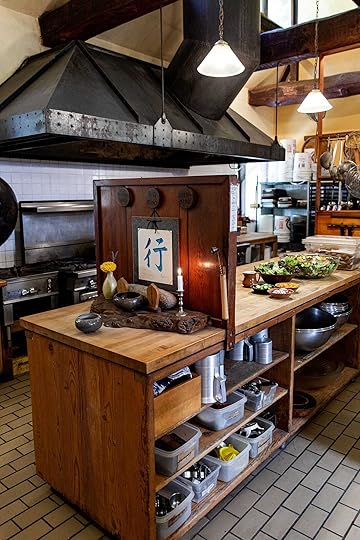
(Tassajara, Zen Mountain Center Kitchen)
When I enter the Tassajara kitchen, or any kitchen, I can see ordinary counters, pots and pans, and knives, onions and carrots, ordinary people preparing ordinary food. Or I can see a place of practice, of the aspiration to not only produce wholesome, tasty, healthy meals, but to serve, to respect, and to love – the people in the kitchen and those who are about to be fed and nourished. The same is true in any workplace – is it a place that is stuck in old, unhealthy patterns or is it a place of learning, growth, and appreciation?
Shunryu Suzuki in a talk called Express Yourself Fully, from the book Not Always So says:
“Our way is not to criticize others but know and appreciate them. Sometimes you may feel you know someone too well, and you have difficulty appreciating them because of your small mind. If you continue practice together, and your mind is big enough to expose yourself and to accept others, naturally you will become good friends. To know your friend is to know something beyond yourself, beyond even your friend.”
Here are a few other practices from Instructions To The Head Cook:
· Be thorough. Slow down. Pay attention to details.
· Encourage yourself with complete sincerity.
· Those who had shortcomings yesterday can act correctly today.
· Don’t make assumptions about what is sacred and what is ordinary. What if everything were both ordinary and sacred?
· Let go of comparing, judgmental, overly-critical mind.
We are all the head cooks in this kitchen that we call our work, our relationships, our lives. Let’s practice working together with whatever ingredients we have, with wholehearted sincerity, with joy, and appreciation.
Do Not See With Ordinary Eyes. Do Not Think With Ordinary Mind.
My Favorite Quote This Week
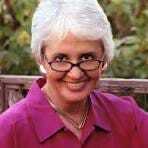
(Rachel Naomi Remen)
“We carry with us every story we have every heard and every story we have ever lived, filed away at some deep place in our memory. We carry most of those stories unread, as it were, until we have grown the capacity or the readiness to read them. When that happens they may come back to us filled with a previously unsuspected meaning. It is almost as if we have been collecting pieces of a greater wisdom, sometimes over many years without knowing.”
– Rachel Naomi Remen, Kitchen Table Wisdom
What I’m Watching
Turtles All The Way Down. I loved this film about a teenage girl struggling with OCD and depression. And, it’s so much more than that. It’s simple, deep, and creative.
Half Day Sitting, In-Person and Online
Sunday, May 26th, 9:00 a.m. – 12:30 p.m. in Mill Valley.
I really like half day retreats, where there is time for some extended meditation periods, some walking, and time to process with a small community. Then, time to enjoy a Sunday afternoon.
Weekend Retreat at Green Gulch Farm
November 1 – 3
Come spend the weekend at Green Gulch Farm, located on the coast, just north of San Francisco. Wake up hearing the sound of the ocean, enjoy the simple but amazing vegetarian food, and explore the garden, farm, and coastal trails.
In our world of busyness, of more, faster, better, this retreat offers time to stop, reflect, and renew – a time to step fully into the richness of your life. Together we’ll follow a gentle schedule of sitting and walking meditation, interspersed with talks and discussions from the wisdom of Zen teaching as we explore how these stories and dialogues may be utilized in our relationships, our work, and our lives.
This retreat is open to all people interested in stopping, exploring, and bringing more awareness and mindfulness to daily life.
The post Do Not See With Ordinary Eyes. Do Not Think With Ordinary Mind appeared first on Marc Lesser.
May 2, 2024
Letting Go of Expectations
· Insights Into Practices
· A Poem, by William Stafford
· What I’m watching
· Half Day Retreat
· Weekend Retreat
In 1922, a prominent Paris newspaper asked its readers: If you knew that the world was about to end, how would you spend your last hours?
Many readers wrote back, but most notably novelist Marcel Proust responded by saying, “I think that life would suddenly seem wonderful to us if we were threatened to die as you say. Just think of how many projects, travels, love affairs, studies our life hides from us, made invisible by our laziness, which certain of a future delays them incessantly.”
Zen teacher Shunryu Suzuki suggests that meditation is the practice of letting go of all the concerns of our daily lives. Similar to the question posed by the 1922 French newspaper, he suggests exploring the practice letting go of our assumptions and expectations. Here are his instructions for meditation: (from Not Always So)
“So for a period of time each day, try to sit without moving, without expecting anything, as if you were in your last moment. Moment after moment you feel your last instant. In each inhalation and each exhalation there are countless instants of time. Your intention is to live in each instant…
When you practice this in your last moment, you will have nothing to be afraid of…You become one with everything after you completely exhale with this feeling. If you are still alive, naturally you will inhale again “Oh, I’m still alive! Fortunately or unfortunately!”
When you do this practice, you cannot easily become angry.”
Neuroscientist, Regina Pally, in a paper called The Predictive Brain said:
“According to Neuroscience, even before events happen the brain has already made a prediction about what is most likely to happen, and sets in motion the perception, behaviors, emotions, physiologic responses and interpersonal ways of relating that best fit with what is predicted…”
Practicing with reducing or letting go of our expectations and prediction is an important skill for leadership and for life.
The Practice
Gradual and Sudden Practice – I appreciate this way of describing and contextualizing meditation practice. It feels simple and impossible, at the same time. Just let go of expectations. Just be willing to let go of your life with each exhale. Easy, right? He suggests, just doing it, each day, and see what happens. In this way change happens both gradually and all at once.
Appreciate Your Experience – Instead of adding something or doing something, the practice is to let go of our usual expecting and predicting what will happen next. We spend so much of our days planning, projecting, and predicting; working hard so we can have free time; searching for some rest, satisfaction, and connection when we are not working. The practice is to let go of searching and expecting and to try on appreciating and enjoying your experience.
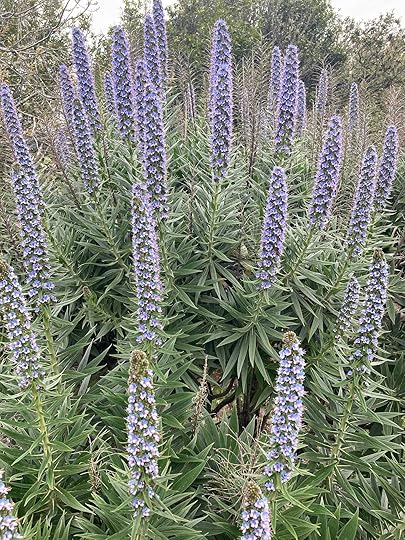
The Benefits
Less Fear – By practicing this way we shift our relationship with change and uncertainty. We are less afraid of letting go and of losing everything.
Less Anger – There is so much to be angry about, so much that could be and should be better, in our relationships, work, our world. Engaging in this practice helps calm the human proclivity toward scanning for threats, satisfies the part of us that is often seeking something new and better, and reassures our empathic nature that we are always connected, beyond anything we can comprehend.
Healthier and More Effective Work Environments – It is so easy and so common at work to believe we know how others will respond. Letting go of expectations means to be more curious and to look more deeply at our own patterns. One way to practice this at work is to spend more time expecting the best of others.
A Poem
Remind Me, by William Stafford
Remind me again—together we
trace our strange journey, find
each other, come on laughing.
Some time we’ll cross where life
ends. We’ll both look back
as far as forever, that first day.
I’ll touch you—a new world then.
Stars will move a different way.
We’ll both end. We’ll both begin.
Remind me again.
What I’m watching
Shogun, a new 10-part series. I find myself looking away at the unnecessary violence, but I find myself leaning in to better understand Japan in the 1600’s – the architecture, culture, relationships, and political power moves.
Half Day Sitting, In-Person and Online
Sunday, May 26th, 9:00 a.m. – 12:30 p.m. in Mill Valley.
I really like half day retreats, where there is time for some extended meditation periods, some walking, and time to process with a small community. Then, time to enjoy a Sunday afternoon.
Weekend Retreat at Green Gulch Farm
November 1 – 3
Come spend the weekend at Green Gulch Farm, located on the coast, just north of San Francisco. Wake up hearing the sound of the ocean, enjoy the simple but amazing vegetarian food, and explore the garden, farm, and coastal trails.
In our world of busyness, of more, faster, better, this retreat offers time to stop, reflect, and renew – a time to step fully into the richness of your life. Together we’ll follow a gentle schedule of sitting and walking meditation, interspersed with talks and discussions from the wisdom of Zen teaching as we explore how these stories and dialogues may be utilized in our relationships, our work, and our lives.
This retreat is open to all people interested in stopping, exploring, and bringing more awareness and mindfulness to daily life.
Zen Bones is a reader-supported publication. To receive new posts and support my work, consider becoming a free or paid subscriber.
The post Letting Go of Expectations appeared first on Marc Lesser.
April 25, 2024
Enjoy Your Life
In this issue:
· Insights Into Practices
· A Poem, by Diane di Prima
· What I’m reading
· Half Day Retreat
· Weekend Retreat
When I turned 60, I felt compelled to change my pretend age from 37 to 47. Not that I’m in denial (maybe a little) about getting older, but I feel young, healthy and vibrant (and lucky)…and yet, there is that age thing. Back when I was CEO of Brush Dance, a greeting card company I founded and ran for 15 years, we once published a greeting card that said, “Age is just a number, and mine is unlisted.”
Someone once asked Zen teacher Shunryu Suzuki, “Why do we practice?”
His response, “We practice so we can be happy in our old age.” He also said, “The only way is to enjoy your life. That is why we practice meditation. The most important thing is to be able to enjoy your life without being fooled by things.”
I was teaching a daylong mindful leadership training last week and when it came time to stop for our lunch break I suggested the radical practice of “noticing your food” and “tasting and enjoying your food.” One way we are “fooled by things” is not just enjoying and appreciating our food, our breath, our work, and our lives. We get fooled by thinking about some other better food, or some other better, more fulfilling work.
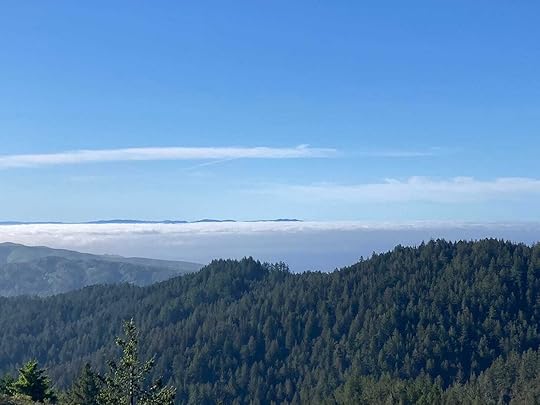
(Sunday morning on Mount Tamalpais)
Simple, surprising and perhaps radical. Just noticing and enjoying. Somehow it does seem to take practice. And it seems to take stepping out of the stream of our full and busy lives, practicing with stopping, noticing, and enjoying the simple act of breathing – even when it’s boring, and our minds are jumpy, our legs not always comfortable.
This doesn’t mean we don’t envision and work toward what needs more attention, and what could be clearer and more effective. One of my favorite paradoxes is: Accept what is and work for change. It is easy to lose sight of the “accept what is” and to constantly be working or striving for change. I think this is, in part, another way we are fooled by things.
Thich Nhat Hanh says:
“We can learn a lot from our suffering, and there is always something we can do to transform it into joy, into happiness, into love. It is only by having the courage to encounter our own suffering that we can generate the clarity and compassion we need to serve the world.
The meditator breathes in and says “Hello my dear, my anger, my despair. I will take good care of you.” The moment you recognize the feeling and smile to it with love and care, embracing the fear with mindfulness, it will begin to change. This is the miracle of mindfulness.”
Enjoying our lives, doesn’t mean to ignore wars, injustices, and the climate crisis. We will continue to face challenges and painful situations at work, in our families, and in all aspects of life. Enjoying our lives doesn’t suggest not grieving, or seeing and feeling the pain of what is. Enjoying your life does not mean living in denial.
To practice is to relish the moments, to see they are precious, and feel and transform whatever we are being offered when times are hard.
Shunryu Suzuki in a talk titled Enjoy Your Life, says: “The evanescence of things is the reason why you enjoy your life.”
A Poem
Radio, Diane di Prima
I think I forgot to turn
off the radio when
I left my mother’s
womb
In Hasidic Judaism
it is said that before we
are born an angel
enters the womb,
strikes us on the
mouth
and we forget all
that we knew of
previous lives—
all that we know
of heaven
I think that I forgot
to forget.
I was born into two
places at once—
In one, it was chilly
lonely physical &
uncomfortable
in the other, I stayed
in the dimension of
Spirit. What I knew,
I knew.
I did not forget
Voices
The world of spirit
held me in its arms.
—Diane di Prima (1934-2020)
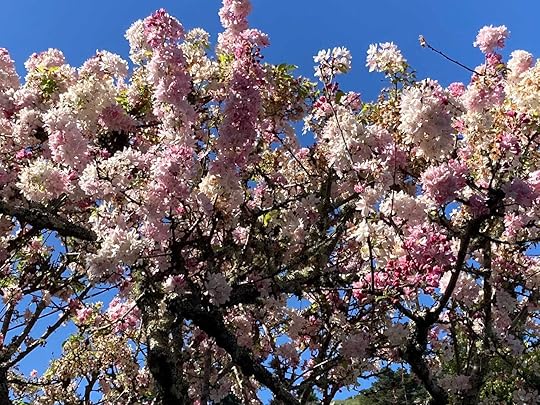
What I’m reading
Same As Ever. A Guide To What Never Changes, by Morgan Housel. 23 stories that teach, challenge, and entertain.
The Most Important Point. Zen Teaching of Edward Espe Brown. I find myself returning to Ed’s talks that integrate Zen practice with everyday life in ways that are both deep and charming.
Half Day Sitting, In-Person and Online
Sunday, May 26th, 9:00 a.m. – 12:30 p.m. in Mill Valley.
I really like half day retreats, where there is time for some extended meditation periods, some walking, and time to process with a small community. Then, time to enjoy a Sunday afternoon.
Weekend Retreat at Green Gulch Farm
November 1 – 3
In our world of busyness, of more, faster, better, this retreat offers time to stop, reflect, and renew – a time to step fully into the richness of your life. Together we’ll follow a gentle schedule of sitting and walking meditation, interspersed with talks and discussions from the wisdom of Zen teaching as we explore how these stories and dialogues may be utilized in our relationships, our work, and our lives.
This retreat is open to all people interested in stopping, exploring, and bringing more awareness and mindfulness to daily life.
The post Enjoy Your Life appeared first on Marc Lesser.



